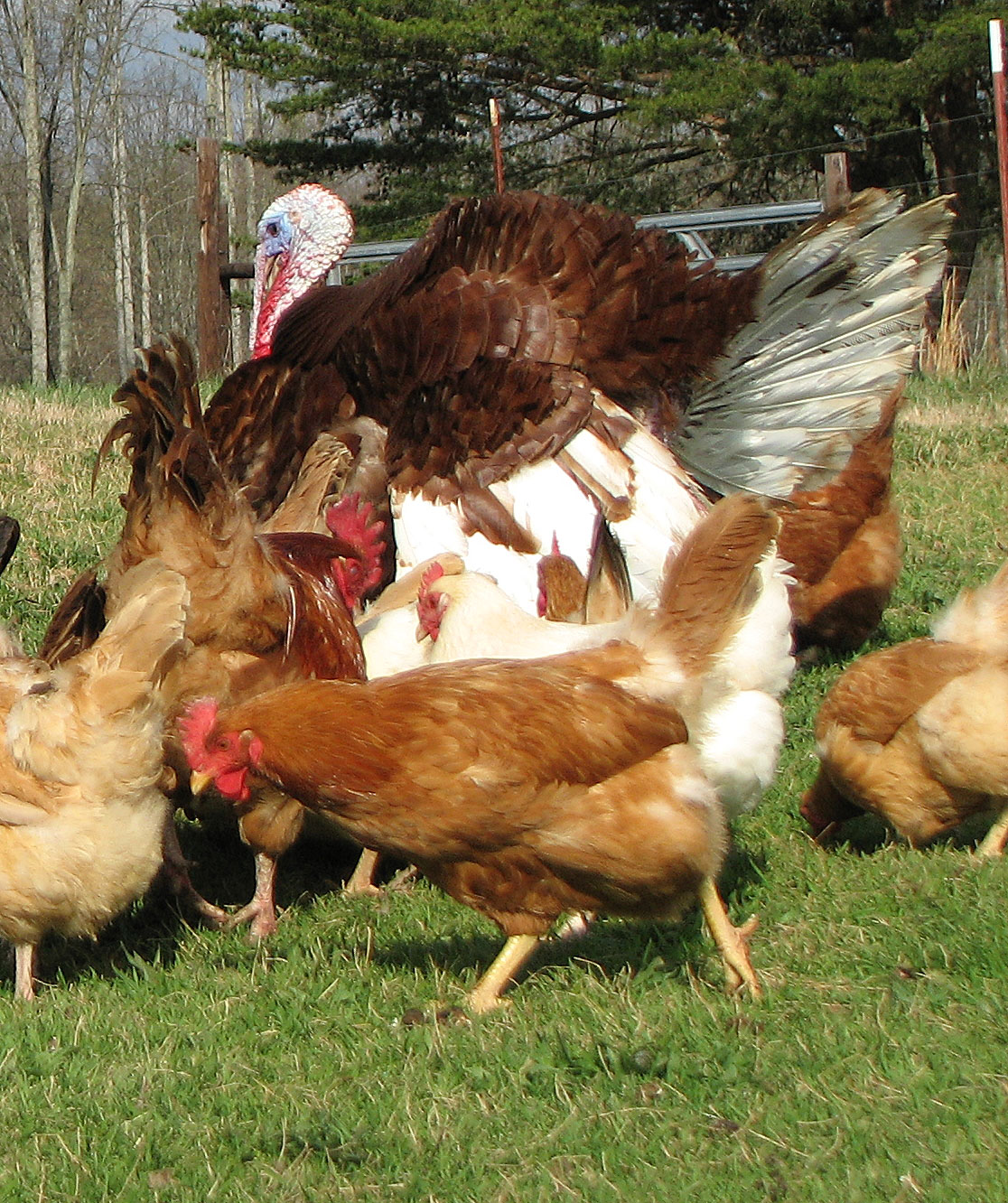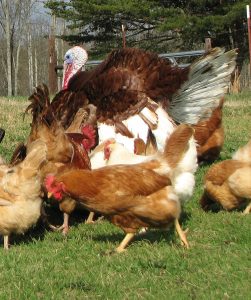
Conventional wisdom says you should never keep turkeys and chickens together, because turkeys are susceptible to blackhead, a disease with devastating consequences. However, lots of backyarders raise chickens and turkeys together without a problem, and with some benefits. Here are three good reasons to keep turkeys with chickens, and two reasons not to.
Thumbs Up
- On the up side, newly-hatched turkey poults tend to get off to a slow start, but chicks are somewhat quicker on the uptake. Poults brooded with chicks learn to eat and drink more readily by following the chicks.
- Broody chickens may be used to hatch turkey eggs. A medium-size chicken can handle about half a dozen turkey eggs. Soon after the eggs hatch, most broody hens will accept six or so additional poults slipped in with the ones she hatched.
- Chickens raised with turkeys acquire a sort of immunity to Marek’s disease. Turkeys carry a related, although harmless, virus that keeps the Marek’s virus from causing tumors in chickens.
Thumbs Down
- On the downside, chickens are attracted to a tom turkey’s tail display, and may follow the tom, picking feathers from his rear end. If not stopped — by separating the offending chicken(s) from the tom — the situation can turn bloody.
- And, of course, there’s the issue of blackhead, a serious disease of turkeys caused by the protozoa Histomonas meleagridis (and therefore technically called histomoniasis). These protozoa live in most poultry environments, except where the soil is dry, loose, and sandy.
Although the disease is commonly called blackhead, the head of an affected bird does not always darken. Sometimes, though, the disease causes reduced oxygen in the blood, resulting in a dark blue or black appearance to the skin. Other signs include weight loss, droopiness, diarrhea, and sometimes bloody droppings, which may be mistaken for coccidiosis. A classic sign is bright yellow droppings. Sometimes a dead turkey is the first sign of this disease.
The blackhead protozoa are carried by the Heterakis gallinarum, also known as cecal worms, the most common parasitic worm in North American poultry. The infection is spread by cecal worms and their eggs, expelled in droppings and subsequently eaten by foraging turkeys. Earthworms may eat infected cecal worm eggs, then infect a turkey that eats the earthworms.
Without the protection of a cecal worm egg, blackhead protozoa die quickly. However, when protected by a cecal worm egg, the protozoa can survive in the environment for many years. Once a flock becomes infected, blackhead is therefore difficult to eliminate from the flock or the land.
Although chickens commonly carry the blackhead protozoa without being infected, turkeys—especially young ones—are highly susceptible and can easily get infected by chickens. Since an outbreak of blackhead requires the presence of both histomonad protozoa and cecal worms, you can minimize the spread of blackhead from chickens to turkeys by worming regularly to reduce cecal worm populations and by not bringing home new poultry that may bring trouble with them.
And that’s today’s news from the Cackle Coop.
Gail Damerow, author, The Chicken Health Handbook



Ive read the article on the pros/cons of chickens and turkeys together…would this also apply if raising both BBW Turkeys and Broilers together for the 8-9 weeks the broilers would be around before processing? Understandable there may be some bullying by the Turks due to size difference…
what meds do you use to de-worm chickens and turkeys?
We have found Diatomaceous Earth works wonders as a dewormer. Some natural/organic options also include Oregano, Apple Cider Vinegar, Garlic, Pumpkin Seeds, and cultured foods such as yogurt or buttermilk.
Would diatamatious earth kill parasites in turkeys?
You can use it as a natural dewormer and you can dust them for lice/mites..
Can the Turkeys have apple cider vinegar like the chicks should be given?
Yes, they can…we actually recommend it.
If turkeys and chickens are kept together outside as adults, can they be offered the same feed? (Our scenario would be free range)
What feed do you recommend giving chicks and turkey poults who are raised together?
While in the brooder, they can both eat the chick starter.
Very helpful
Thanks
I have chickens and Turkeys coming from you guys. Is it ok to have them both in the same brooder or should i keep them separated.
Yes, we actually recommend them being in the same brooder. There’s no need to separate them until it’s time to go outside.
I thought the protein content needs to be higher for poults than it does for baby chicks?
It does, when they get bigger. To start, in the brooder, using the same food is acceptable.